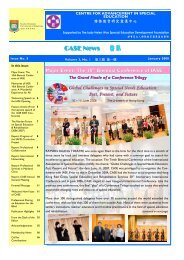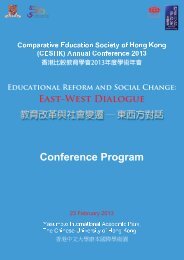C E R C u l a r - Faculty of Education - The University of Hong Kong
C E R C u l a r - Faculty of Education - The University of Hong Kong
C E R C u l a r - Faculty of Education - The University of Hong Kong
Create successful ePaper yourself
Turn your PDF publications into a flip-book with our unique Google optimized e-Paper software.
CERCular<br />
Vol.10, No.2, 2004<br />
No.10<br />
2001; 312pp.<br />
ISBN 962 8093 71 1<br />
HK$200 / US$32<br />
Values <strong>Education</strong> for Dynamic Societies: Individualism or Collectivism<br />
Edited by William K. Cummings, Maria Teresa Tatto & John Hawkins<br />
Social changes have made values education an important topic for academics, policy makers and<br />
practitioners in all parts <strong>of</strong> the world. This book examines values education in a diverse set <strong>of</strong> societies.<br />
Some, including China, the United States and Russia, are very large countries. At the opposite end <strong>of</strong><br />
the scale, Singapore, <strong>Hong</strong> <strong>Kong</strong> and Taiwan are much smaller societies but are no less complex.<br />
Other chapters focus on Japan, Korea, Malaysia, Mexico and Thailand.<br />
All these societies have very different cultures and heritages. Through its comparative analysis,<br />
the book significantly enhances conceptual understanding <strong>of</strong> this complex domain. An intriguing<br />
finding is the emerging support in Asia for individualistic values and, by way <strong>of</strong> contrast, the new<br />
interest in collective values in the West.<br />
Knowledge Across Cultures: A Contribution to Dialogue Among Civilizations<br />
Edited by Ruth Hayhoe & Julia Pan<br />
At the start <strong>of</strong> the new millennium, the United Nations designated 2001 the ‘Year <strong>of</strong> Dialogue among<br />
Civilizations’. This dialogue emerged after the collapse <strong>of</strong> the Sov iet Union in 1991, and changed<br />
much <strong>of</strong> the field <strong>of</strong> comparative education. <strong>The</strong> dialogue draws attention to deep-rooted cultural<br />
differences around the world which shape approaches to education.<br />
This book gives voice to outstanding scholars from three major Eastern civilizations – Chinese,<br />
Arabic and Indian – who have entered into dialogue with equally distinguished scholars from the<br />
West. One <strong>of</strong> the authors, Abdus Salam, was the first scientist from Pakistan to win the Nobel Prize in<br />
Physics. <strong>The</strong> themes <strong>of</strong> the book include challenges to knowledge in the late modern era; Eastern<br />
contributions to scientific knowledge; knowledge transfer across regions and civilizations; indigenous<br />
knowledge and modern education; and past and present influences from China. <strong>The</strong> book contributes<br />
to an ongoing dialogue among civilizations, and seeks to enhance mutual understanding in<br />
the increasingly globalized society <strong>of</strong> the 21st Century.<br />
This book on the socialization <strong>of</strong> the child in diverse cultures focuses on parent-child relationships,<br />
enculturation, and child development under changing educational conditions. Twelve articles<br />
originally published by the author and his colleagues between 1960 and 1996 show the evolution not<br />
only in LeVine’s thinking but in the field as a whole. <strong>The</strong>se articles are supplemented by new commentaries<br />
written for this volume. LeVine examines intersections among patterns <strong>of</strong> childhood experience,<br />
cultural values and institutional change in developing societies during the 20 th century. Individual<br />
chapters include a focus on Kenya, Nigeria and Mexico; parenting, the child’s acquisition <strong>of</strong> culture,<br />
and the impact <strong>of</strong> mass schooling on maternal care; and critiques <strong>of</strong> psychoanalysis, environmentalism<br />
and the psychology <strong>of</strong> individual differences.<br />
In the introduction, LeVine frames his research on the comparative <strong>of</strong> study <strong>of</strong> socialization as<br />
an “anthropology <strong>of</strong> educational processes” that integrates knowledge the educational aspects <strong>of</strong><br />
childhood in human societies under varied historical conditions. This far-reaching book has been<br />
widely welcomed by scholars <strong>of</strong> comparative education and <strong>of</strong> child development.<br />
6<br />
No.11<br />
2001; 391pp.<br />
ISBN 962 8093 73 8<br />
HK$250 / US$38<br />
No.12 Childhood Socialization: Comparative Studies <strong>of</strong> Parenting, Learning and <strong>Education</strong>al Change<br />
Robert A. LeVine<br />
2003; 299pp.<br />
ISBN 962 8093 61 4<br />
HK$200 / US$32<br />
10th Anniversary: Highlights from CERC’s first decade<br />
Centralization and Decentralization: <strong>Education</strong>al Reforms and Changing Governance in<br />
Chinese Societies<br />
Edited by Mok Ka-Ho<br />
Globalization has brought dramatic changes to the character and functions <strong>of</strong> education in most<br />
countries around the world. However, the impact <strong>of</strong> globalization on schools and universities is not<br />
uniform. One public-policy strategy that has been widely adopted is decentralization; but there is no<br />
consensus on whether centralization or decentralization is more effective to improve organization<br />
and management in education.<br />
This book is contextualized in the literature on globalization, and examines how policies <strong>of</strong><br />
decentralization have affected the running <strong>of</strong> education in <strong>Hong</strong> <strong>Kong</strong>, Taiwan, Shanghai, Singapore,<br />
Macau and Mainland China. It analyzes the strategies that the governments <strong>of</strong> the selected societies<br />
have adopted in reforming the structure <strong>of</strong> their education systems, mobilizing different forces to<br />
create more educational opportunities, and devising new measures to assure quality in the education<br />
sector.<br />
No.13<br />
2003; 230pp.<br />
ISBN 962 8093 58 4<br />
HK$200 / US$32

















